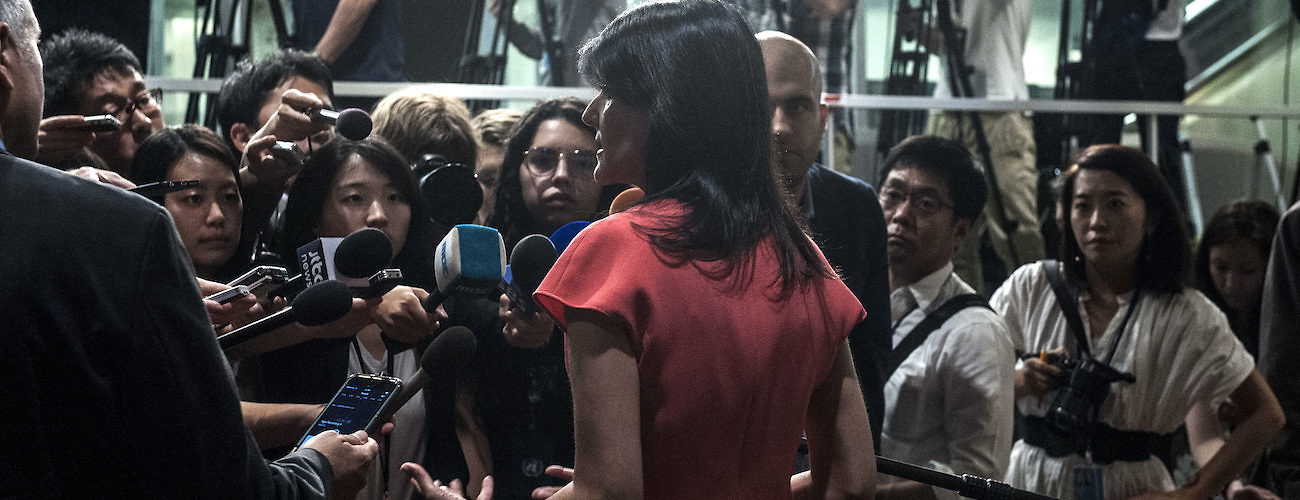United States Permanent Representative to the UN Nikki Haley addresses the media after the Security Council unanimously adopted Resolution 2371 on North Korea's nuclear program. New York, August 5, 2017 (Kim Haughton/UN Photo)
At the beginning of this week, the United Nations Security Council imposed new sanctions on North Korea in response to that country’s continuing provocative nuclear weapons tests. After years of failed international attempts to bring its leadership to heel, will the outcome be any different this time?
To begin answering that question, a bit of historical context is needed. The United States first imposed economic sanctions against North Korea in 1950 at the beginning of the Korean War. Even then, one of the primary aims of this coercive effort was “military impairment.” In the more than half a century that has passed since then, Washington has added further sanctions, but Pyongyang has proven to be highly resistant to economic pressure due to its domestic political structure and political economy.
In addition to the sanctions imposed by the US, the UN has also imposed its own economic restrictions, beginning in 2006 after the country’s first nuclear test. Those UN sanctions limit access to military technology and equipment as well as curtailing the access of elites to some luxury goods.
The tenor of relations between North Korea and western nations led by the US has shifted in recent years. The country’s actions and rhetoric have become more aggressive and antagonistic since the death of Kim Jong-il and the rise of his son Kim Jong-un. During the 1990s, under the leadership of Kim Jong-il, a strange sort of equilibrium was reached between North Korea (DPRK) and the West. Whenever the DPRK ramped up its weapons programs, the aim often seemed to be gaining some economic concessions from the US and other Western countries, often taking the form of food assistance or other types of aid.
Kim Jong-un’s bargaining strategy has been different. Rather than an opportunity for negotiated gains, the current leadership has treated the sanctions as an obstacle to overcome. To do so, its members have developed sophisticated methods for circumventing the sanctions that include frequently changing the name of business enterprises and taking advantage of the willingness of Chinese firms to trade with them in the name of “humanitarian exemptions” that were allowed under earlier sanctions regulations. The newest UN sanctions employ more stringent language, and one of the key questions surrounding these new measures is whether or not China will comply and strictly enforce them.
The DPRK has strived to enhance its military technology as an end in itself. Since the ascension of Kim Jong-un in 2012, the country has become more vehement about its desire for nuclear weapons, viewed as a necessity by a small state surrounded by powerful ones. In 2013, the Party Central Committee formally adopted “Byungjin Line”—the country’s policy of pursuing the parallel goals of economic development and a robust nuclear weapons program. While many of those outside of North Korea see these goals as being in direct conflict with one another, the regime views them as complementary.
So why are the new sanctions imposed by the UN important? To a large extent, new sanctions do little to alter Kim Jong-un’s calculus. Further limits on economic exchange that is already sharply limited will not have a major additional impact. The new sanctions limit outside investment in North Korea and bans the export of seafood and minerals, which were major contributors to the national economy last year. The new sanctions do not include limits on oil to the North Korean military, something for which the US advocated. Both Russia and China have exported large amounts of crude oil to North Korea in recent years.
While the new sanctions were passed unanimously in the Security Council, one of the primary issues regarding their effectiveness concerns cooperation from China. Under prior sanctions, the Chinese have not strictly enforced the measures despite having voted in the Security Council in support of them. The majority of North Korea’s external trade in recent years has been with China. The government in Beijing has resisted the imposition of harsh sanctions against North Korea, fearing that if the measures were effective in bringing down the regime, China would face two unwanted consequences: First, a flood of North Korean refugees, and second, the reunification of the country with South Korea. Because North Korea neighbors China, these concerns are of critical importance to Beijing.
The recent success of the North Korean missile tests has upped the ante. Chinese attitudes towards the country appear to be shifting as the tensions heighten. Earlier this year, Beijing announced that it would stop importing coal from North Korea. (Under the new sanctions, North Korean coal exports are banned completely.) On the other hand, Chinese leaders have repeatedly argued that its influence with the leadership in Pyongyang is minimal.
Following the imposition of the sanctions and fiery rhetoric from US President Donald Trump, North Korea has respond with a direct threat against US military bases in Guam. This is not the first time that North Korea has threatened Guam, but tensions have not been this high in many years.
North Korea has been seen as a tough target because thus far the country has seemed insensitive to both sanctions and engagement. As a result, expectations about the ability of other nations to influence the behavior of the country should be limited. North Korea has made a great deal of progress in its nuclear and missile programs in recent years, and many experts think it is unlikely that these new sanctions will prompt them to change course.
Susan Hannah Allen is Associate Professor of Political Science at the University of Mississippi.





